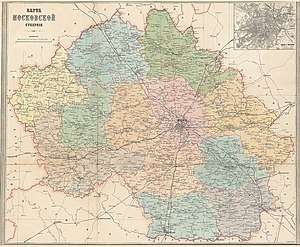Moscow Governorate
Moscow Governorate (Russian: Московская губерния; pre-reform Russian: Московская губернія), or the Government of Moscow, was an administrative division (a guberniya) of the Tsardom of Russia, the Russian Empire, and the Russian SFSR, which existed in 1708–1929.
| Moscow Governorate Московская губерния | |||||||
|---|---|---|---|---|---|---|---|
| Governorate of Russian Empire | |||||||
| 1708–1929 | |||||||
 Map of Moscow Governorate | |||||||
| Capital | Moscow | ||||||
| Population | |||||||
• 1897 | 2,430,581 | ||||||
| History | |||||||
• Established | 1708 | ||||||
• Disestablished | 1929 | ||||||
| |||||||

History
Moscow Governorate, together with seven other governorates, was established on December 29 [O.S. December 18], 1708, by Tsar Peter the Great's edict.[1] As with the rest of the governorates, neither the borders nor internal subdivisions of Moscow Governorate were defined; instead, the territory was defined as a set of cities and the lands adjacent to those cities.[2]
Subdivisions
| # | City | # | City | # | City |
|---|---|---|---|---|---|
| 1. | Moscow | 14. | Lyubim | 27. | Suzdal |
| 2. | Aleksin | 15. | Medyn | 28. | Tarussa |
| 3. | Borovsk | 16. | Mikhaylov | 29. | Tsarev Borisov |
| 4. | Dedilov | 17. | Mozhaysk | 30. | Tula |
| 5. | Dmitrov | 18. | Obolensk | 31. | Veneva |
| 6. | Gremyachey | 19. | Pecherniki | 32. | Vereya |
| 7. | Kaluga | 20. | Pereslavl Ryazanskoy | 33. | Volodimir |
| 8. | Klin | 21. | Pereslavl Zaleskoy | 34. | Volokolamsk |
| 9. | Kolomna | 22. | Pronsk | 35. | Yaroslavets Maly |
| 10. | Koshira | 23. | Rostov | 36. | Yepifan |
| 11. | Kostroma | 24. | Ruza | 37. | Yuryev Polskoy |
| 12. | Krapivna | 25. | Serpukhov | 38. | Zaraysk |
| 13. | Lukh | 26. | Shuya | 39. | Zvenigorod |
The governorate underwent numerous changes in the following years, and was finally abolished on January 14, 1929 when modern Moscow Oblast was created.
Demography
Language
- Population by mother tongue according to the Imperial census of 1897.
| Language | Number | percentage (%) | males | females |
|---|---|---|---|---|
| Russian | 2,371,102 | 97.5 | 1,181,296 | 1,189,806 |
| German | 19,116 | 0.7 | 9,225 | 9,891 |
| Polish | 10,960 | 0.4 | 7,676 | 3,284 |
| Jewish | 5,756 | 0.2 | 3,795 | 1,961 |
| Ukrainian | 5,506 | 0.2 | 4,838 | 668 |
| Tatar | 5,469 | 0.2 | 4,492 | 977 |
| French | 2,621 | 0.1 | 1,035 | 1,586 |
| Armenian | 1,633 | 0.0 | 1,201 | 432 |
| Belarusian | 1,292 | 0.0 | 948 | 344 |
| English | 1,135 | 0.0 | 559 | 576 |
| Latvian | 1,018 | 0.0 | 731 | 287 |
| Lithuanian | 690 | 0.0 | 600 | 90 |
| Czech | 636 | 0.0 | 397 | 239 |
| Gypsy | 511 | 0.0 | 249 | 262 |
| Estonian | 396 | 0.0 | 243 | 153 |
| Italian | 374 | 0.0 | 220 | 154 |
| Greek | 292 | 0.0 | 241 | 51 |
| Swedish | 228 | 0.0 | 117 | 111 |
| Chuvash | 152 | 0.0 | 147 | 5 |
| Komi | 148 | 0.0 | 144 | 4 |
| Bulgarian | 110 | 0.0 | 100 | 10 |
| Other | 1,436 | 0.0 | 1,013 | 423 |
| Total | 2,430,581 | 100.0 | 1,219,267 | 1,211,314 |
Religion
- According to the Imperial census of 1897.[3]
| Religion | Number | percentage (%) | males | females |
|---|---|---|---|---|
| Pravoslavs[4] | 2,272,145 | 93.5 | 1,139,289 | 1,132,856 |
| Old Believers and others split from Pravoslavs | 99,825 | 4.1 | 44,682 | 55,143 |
| Lutherans | 21,437 | 0.8 | 10,701 | 10,736 |
| Roman Catholic | 17,670 | 0.7 | 11,497 | 6,173 |
| Judaism | 8,704 | 0.3 | 5,400 | 3,304 |
| Islam | 5,605 | 0.2 | 4,678 | 927 |
| Reformed | 2,218 | 0.0 | 1,088 | 1,130 |
| Armenian Gregorians | 1,640 | 0.0 | 1,188 | 452 |
| Anglicans | 838 | 0.0 | 441 | 397 |
| Karaites | 347 | 0.0 | 210 | 137 |
| Armenian Catholic Church | 25 | 0.0 | 18 | 7 |
| Buddhists, Lamaists | 11 | 0.0 | 11 | 0 |
| Mennonites | 3 | 0.0 | 3 | 0 |
| Other: Christian denominations | 103 | 0.0 | 52 | 51 |
| Other: non-Christians | 10 | 0.0 | 9 | 1 |
| Total | 2,430,581 | 100.0 | 1,219,267 | 1,211,314 |
References
- Указ об учреждении губерний и о росписании к ним городов (in Russian)
- С. А. Тархов (2001). "Изменение административно-территориального деления России за последние 300 лет". Электронная версия журнала "География".
- Religion Statistics of 1897 (in Russian)
- Eastern Orthodox, including Russian Orthodox, Greek Orthodox, and Georgian Orthodox
Further reading
- William Henry Beable (1919), "Governments or Provinces of the Former Russian Empire: Moscow", Russian Gazetteer and Guide, London: Russian Outlook – via Open Library
![]()
.png)